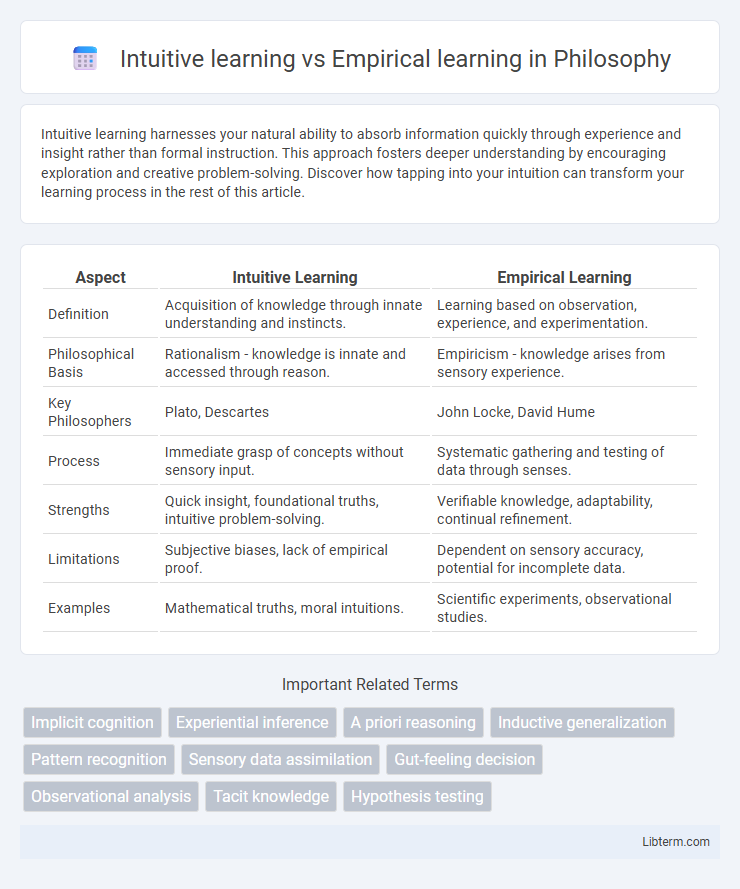Intuitive learning harnesses your natural ability to absorb information quickly through experience and insight rather than formal instruction. This approach fosters deeper understanding by encouraging exploration and creative problem-solving. Discover how tapping into your intuition can transform your learning process in the rest of this article.
Table of Comparison
| Aspect | Intuitive Learning | Empirical Learning |
|---|---|---|
| Definition | Acquisition of knowledge through innate understanding and instincts. | Learning based on observation, experience, and experimentation. |
| Philosophical Basis | Rationalism - knowledge is innate and accessed through reason. | Empiricism - knowledge arises from sensory experience. |
| Key Philosophers | Plato, Descartes | John Locke, David Hume |
| Process | Immediate grasp of concepts without sensory input. | Systematic gathering and testing of data through senses. |
| Strengths | Quick insight, foundational truths, intuitive problem-solving. | Verifiable knowledge, adaptability, continual refinement. |
| Limitations | Subjective biases, lack of empirical proof. | Dependent on sensory accuracy, potential for incomplete data. |
| Examples | Mathematical truths, moral intuitions. | Scientific experiments, observational studies. |
Understanding Intuitive Learning
Intuitive learning involves acquiring knowledge through instinctive understanding and subconscious recognition of patterns, often without explicit reasoning or formal instruction. This type of learning relies heavily on experiential insights and internal motivation, enabling learners to grasp complex concepts quickly and effortlessly. It contrasts with empirical learning, which depends on observation, experimentation, and evidence-based analysis to develop knowledge through systematic inquiry.
Defining Empirical Learning
Empirical learning involves acquiring knowledge through direct observation, experimentation, and sensory experience, emphasizing evidence-based understanding rather than abstract reasoning. It relies on data gathered from real-world interactions and experiments to validate concepts and theories. This method contrasts with intuitive learning, which depends on innate insight or instinctual understanding without the need for empirical evidence.
Key Differences Between Intuitive and Empirical Learning
Intuitive learning relies on innate understanding and gut feelings without conscious reasoning, often drawing from subconscious knowledge and experiences. Empirical learning depends on observation, experimentation, and evidence gathering to form conclusions or knowledge. Key differences include the source of knowledge--internal cognition in intuitive learning versus external data in empirical learning--and the process, where intuition is immediate and holistic, while empirical learning is systematic and analytical.
Cognitive Processes in Intuitive Learning
Intuitive learning relies on subconscious cognitive processes, enabling rapid understanding without explicit reasoning or formal instruction. This type of learning activates pattern recognition and implicit memory systems in the brain, streamlining decision-making and problem-solving. Empirical learning, by contrast, depends on sensory experience and experimentation, involving conscious analysis and evidence-based knowledge acquisition.
Evidence-Based Approaches in Empirical Learning
Empirical learning relies on evidence-based approaches that prioritize observation, experimentation, and data collection to validate knowledge acquisition. This method ensures that learning outcomes are grounded in measurable results and reproducible findings, enhancing reliability and accuracy. Intuitive learning, by contrast, depends more on innate understanding and subjective insight without systematic validation.
Advantages of Intuitive Learning
Intuitive learning leverages innate cognitive abilities to grasp concepts quickly without the need for extensive data or trial-and-error, enabling faster problem-solving and creativity. It fosters deeper understanding through subconscious pattern recognition, which often leads to innovative insights that empirical learning may overlook. This method enhances adaptability in complex or uncertain environments where explicit information is limited or unavailable.
Benefits of Empirical Learning
Empirical learning offers concrete benefits by relying on observation and experimentation, which fosters critical thinking and problem-solving skills through real-world data. This method enhances the retention of knowledge by engaging learners in active participation and hands-on experiences, making abstract concepts more tangible. Empirical learning also promotes adaptability by encouraging learners to revise hypotheses and adjust strategies based on evidence, leading to more accurate and practical understanding.
Limitations of Intuitive Learning
Intuitive learning often relies on gut feelings and subconscious recognition patterns, which can lead to biased or incomplete understanding in complex situations. It lacks the rigorous evidence-based approach of empirical learning, making it vulnerable to errors when faced with contradictory or novel information. The reliance on intuition alone limits its effectiveness in systematically acquiring and verifying knowledge.
Challenges Within Empirical Learning
Empirical learning often faces challenges such as data quality issues, including noise and bias, which can lead to inaccurate conclusions and model overfitting. Limited access to diverse or representative datasets hinders the generalizability of empirical models across different domains or populations. Furthermore, empirical learning relies heavily on extensive experimentation and observation, which can be time-consuming and resource-intensive, restricting its scalability.
Choosing the Right Approach: Integrating Intuition and Empiricism
Choosing the right learning approach involves balancing intuitive learning, which leverages innate understanding and subconscious pattern recognition, with empirical learning, grounded in systematic observation and evidence-based testing. Integrating intuition with empirical methods enhances decision-making by combining rapid insight generation with rigorous validation, leading to more robust knowledge acquisition. Effective learning strategies harness both intuitive leaps and empirical data to optimize problem-solving and innovation across disciplines.
Intuitive learning Infographic

 libterm.com
libterm.com